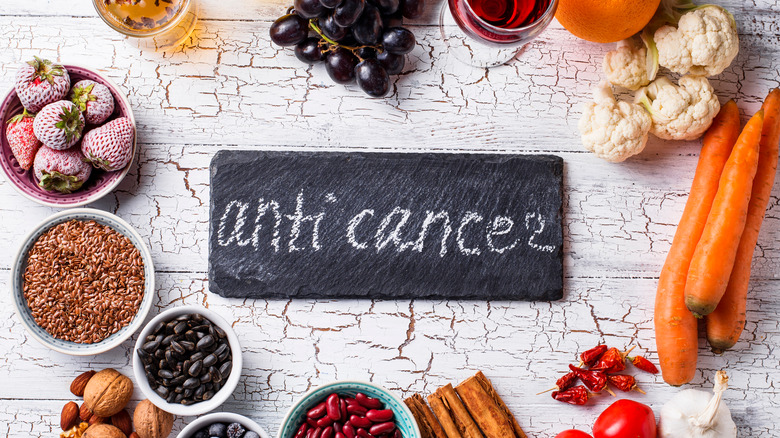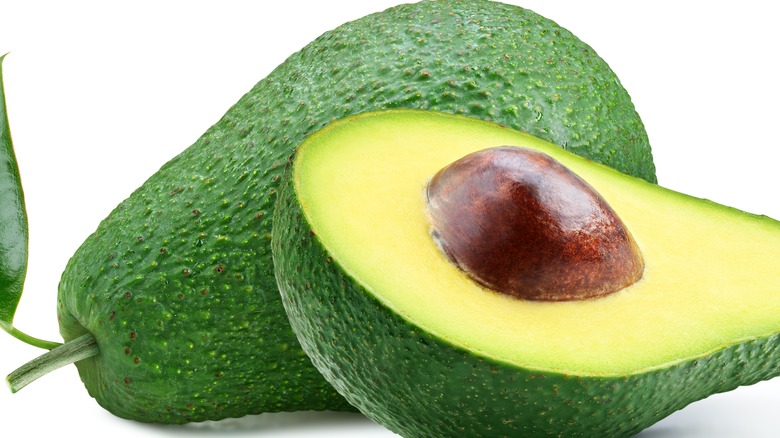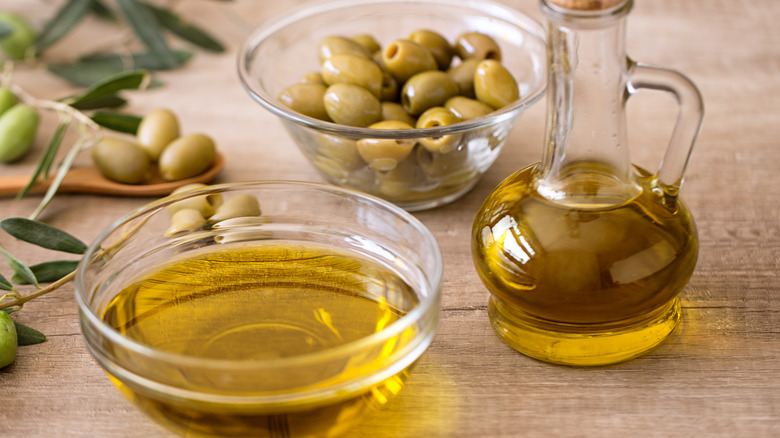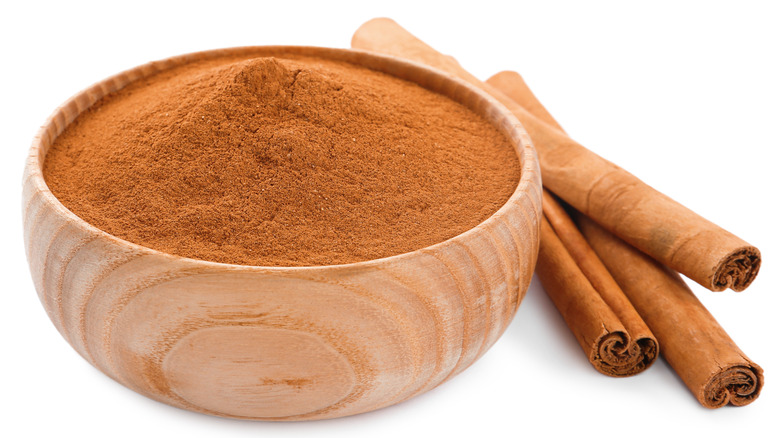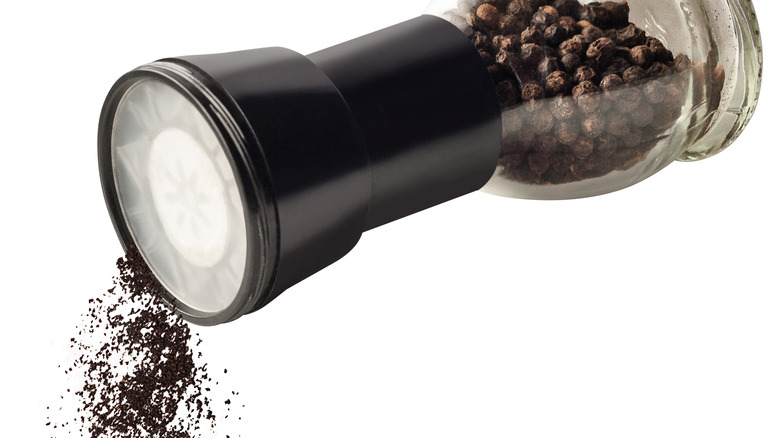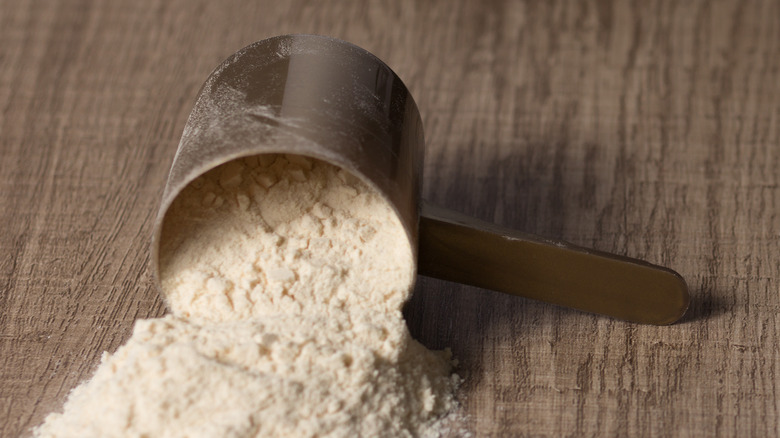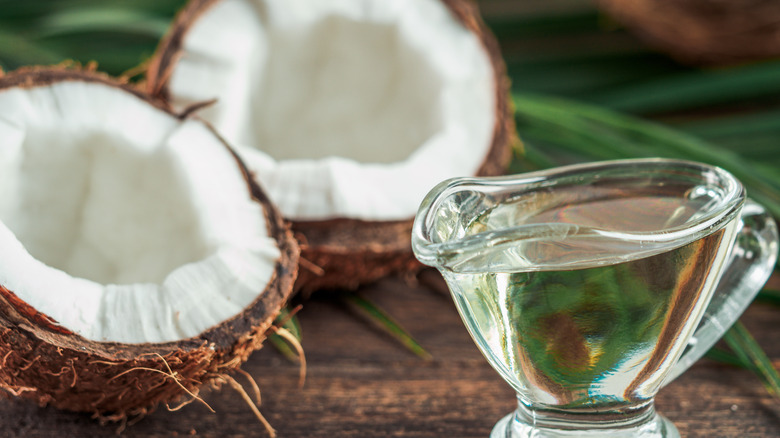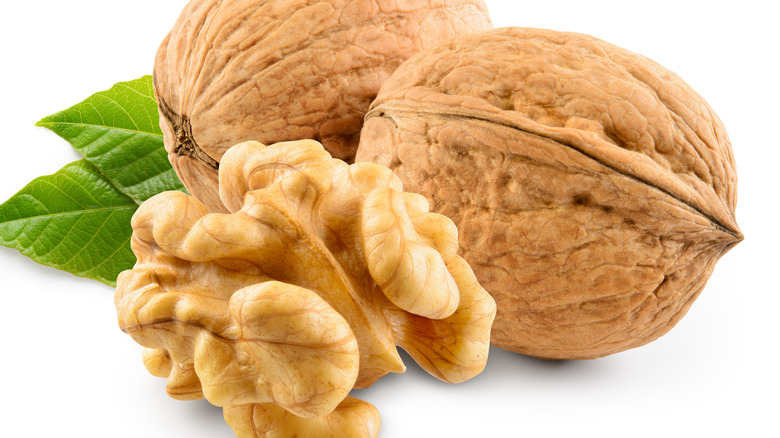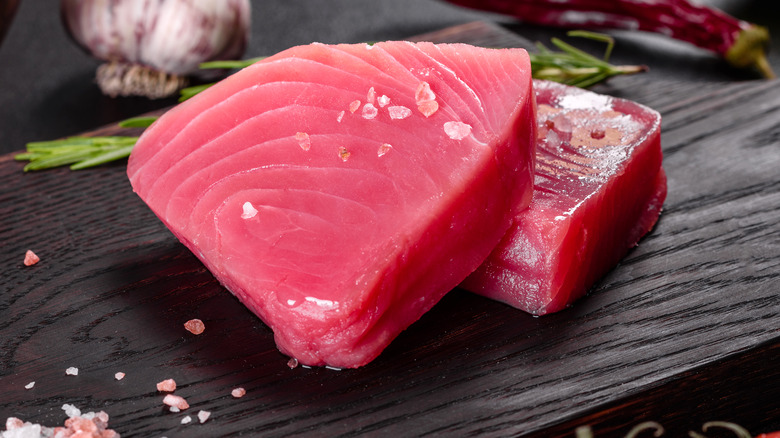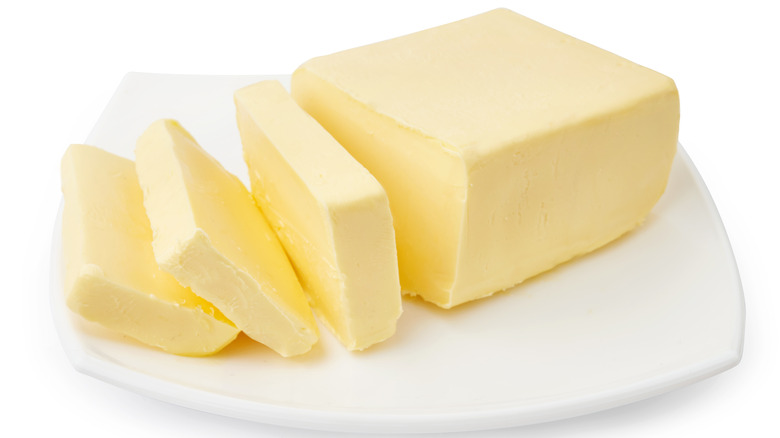The Unexpected Foods That May Help You Prevent Cancer
Diet plays a major role in the development of cancer (via Healthline). For instance, increased consumption of certain foods can help to reduce the risk of cancer.
According to a 2017 comprehensive review published in the American Journal of Cancer Research, more than 50% of all cancer diagnoses and cancer deaths can, for the most part, be prevented. Meanwhile, 30% of all cancer cases are linked to the foods we eat. In addition to providing basic macronutrients (protein, carbs, and fats) and micronutrients (e.g., vitamins and minerals), some foods contain compounds that exert profound health benefits, including chemopreventive (cancer-inhibiting) effects. Foods that supply health-enhancing (though nonessential) compounds that reduce the risk of diseases, notably cancer, are sometimes referred to as "functional foods." These compounds include polyphenols from green tea and sulforaphane from cruciferous vegetables such as broccoli, cauliflower, Brussels sprouts, kale, and cabbage. Per Healthline, other bioactive compounds include the pigments lycopene and astaxanthin found in tomatoes and salmon, respectively.
Evidence from studies conducted for the World Cancer Research Fund and the American Institute for Cancer Research indicate that several widely recognized superfoods such as broccoli, garlic, and berries are closely associated with a lower risk of cancer (via WebMD). This article, however, will highlight some other functional foods that are generally not perceived as cancer fighters, but nevertheless possess formidable anti-cancer properties.
Avocado
Consumption of avocados in the U.S. has tripled since 2000, reports the USDA. According to a 2019 review of studies published in the journal Antioxidants (Basel), evidence for the health benefits of this savory fruit with a creamy taste includes potential anticancer activity.
Laboratory experiments (in a culture dish) as well as some animal studies have shown that extracts of avocado can destroy or inhibit the growth of various types of cancer cells including breast, colon, liver, lungs, larynx, leukemia, esophageal, oral, ovary, and prostate. In one case-controlled study in Jamaican men published in a 2012 edition of the journal Cancer Causes Control, a higher intake of avocado was associated with a decreased risk of prostate cancer. This was attributed to the monounsaturated fat content of avocado, as evidenced by elevated blood levels of oleic acid, the primary monounsaturated fatty acid in avocado.
Per the 2019 review, a variety of phytochemicals and antioxidants found in the avocado may collectively account for its anticancer properties. These include polyphenols, vitamin E, lutein, zeaxanthin, and beta-carotene. Compared to other fruits, avocado is especially high in glutathione, the body's master antioxidant and detoxifier. Intakes of most of these bioactive compounds have been independently shown in clinical trials to reduce the risk of various cancers. One key mechanism for the anticancer activity of these compounds is the reduction of oxidative stress (free radical damage) in healthy tissues, but increased oxidative damage in cancer cells. More randomized controlled trials are needed to further investigate avocado's cancer preventative effects.
Olive oil
As noted by Medical News Today, olive oil's notoriety stems from being a core component of the Mediterranean diet, which is linked to a lower risk of dying from cardiovascular diseases and greater longevity. It is used in cooking and as a dressing for salads and pasta, as well as a dip for bread. While mostly recognized for its cardiovascular benefits, a 2022 systematic review and meta-analysis of 45 studies published in PLOS One reported a 31% lower risk of cancer in association with the highest intake of olive oil versus the lowest olive intake. The strongest protective effect of olive oil was observed for cancers of the breast, digestive tract, respiratory tract, and urinary tract.
These anticancer effects are attributed to olive oil's impressive array of nutrients and other health-promoting compounds. Like avocados, olive oil is rich in monounsaturated fat, mostly oleic acid. Polyphenols such as hydroxytyrosol and oleuropein are potent antioxidants naturally present in olive oil that protect against oxidative stress and DNA damage by destroying harmful free radicals. Another component of olive oil, oleocanthal, has been shown to rapidly kill cancer cells by rupturing vesicles with the cancer cells, resulting in the release of enzymes that cause cell death (per a 2015 study in Molecular Cellular Oncology).
The least processed olive oil is extra virgin olive oil, reports Medical News Today. Since it retains more of the nutrients that are processed out of refined olive oils, extra virgin olive oil is the most healthful (and most pleasant-tasting) variety.
Cinnamon
The popular and delicious spice cinnamon is extracted from the inner bark of trees from the Cinnamomum species (via Healthline). Cinnamon has a long history of use as a condiment, and was once so highly treasured that it was considered as a gift fit for a monarch. Cinnamon is best known for its ability to lower blood sugar levels. Not as well appreciated, however, is its potential to protect against cancer.
According to a review of studies published in a 2018 edition of the Journal of Toxicology, cinnamon and/or its active compounds were shown to have potent antitumor efficacy in a variety of cancers. Extracts of cinnamon exert cancer protective effects at different points in the development of cancer. Cinnamon fights cancer by preventing carcinogenesis (the initiation of cancer formation) and by impeding metastasis (the spreading of cancer cells to other parts of the body).
The active components of cinnamon are found in the oily fraction of the spice and include cinnamaldehyde — which accounts for cinnamon's flavor and aroma — as well as cinnamic acid and eugenol (via a 2015 study in the Journal of Traditional and Complementary Medicine). These bioactive substances found in the cinnamon, collectively termed monophenols, have been shown to suppress the proliferation of prostate cancer cells, leading to their self-destruction (per a 2021 study in the journal Phytotherapy Research).
Black pepper
Regarded as the "King of spices," black pepper (from the vine Piper nigrum) is another commonly used spice that has also been used in traditional medicine to treat menstrual problems and disorders of the ears, nose, and throat (per a 2019 study in Critical Reviews in Food Science and Nutrition). Mostly known for its anti-inflammatory and analgesic properties, black pepper exhibits anticancer effects as well. These effects are mediated primarily by piperine, the major bioactive constituent in black pepper. Several different anticancer mechanisms of black pepper have been identified, including cytotoxicity (killing cancer cells), apoptosis (programmed self-destruction), and the obstruction of signaling pathways.
As reported in a 2014 study published in the journal Anticancer Research, piperine was demonstrated to be the most effective natural plant compound (out of 55) to enhance the efficacy of medical therapies for triple negative breast cancer cells, the most aggressive form of breast cancer. Piperine significantly reduced androgen dependent and androgen independent tumor growth in mice injected with prostate cancer cells, according to a 2016 review of studies in the journal Nutrients. Other cancers in which piperine from black pepper has been shown to exert antitumor activity in cell culture experiments and animal models include colorectal cancer, melanoma, and osteosarcoma.
Whey protein
Whey is the liquid byproduct of cheese production that is subsequently processed into whey protein powder. reports Healthline. Whey protein is a very popular type of supplemental protein powder used by athletes, bodybuilders, or any gym enthusiast. The ability of whey protein to promote muscle growth, when consumed in conjunction with resistance training, is backed by multiple studies. Whey protein's anabolic (building up) effects are tied to its high content of branched-chain amino acids (particularly leucine), essential amino acids known to stimulate muscle protein synthesis.
People who regularly consume whey protein for muscle gains and exercise recovery will be glad to know that whey protein has anticancer properties as well, per a 2015 review in the Journal of Cancer. Animal and laboratory studies have shown that whey protein's rich content of the amino acid cysteine is responsible for whey's cancer protective effects. Cysteine is a key precursor nutrient for the synthesis of glutathione, an important detoxifier and powerful antioxidant in the body. Glutathione protects against cancer formation by inhibiting oxidative stress and by regulating cell growth, differentiation, and programmed self-destruction.
As noted in another review in a 2021 edition of Nutrients, bioactive peptides (protein subfractions that are released when whole whey protein molecules are digested) have been shown to reduce tumor growth and development in both animal models and cell culture studies. These whey-derived peptides (e.g., lactoferrin, alpha-lactalbumin, and beta-lactoglobulin) survive the digestive process and remain intact in the body to exert their effects. Lactoferrin is an especially effective immune booster.
MCT oil
MCT oil is a supplement derived from coconut oil or palm kernel oil, per Medical News Today. It is composed of a type of fat called medium chain triglycerides, which are also found in dairy products. While most dietary fat is in the form of long-chain fatty acids (LCTs) measuring 13 to 21 carbon atoms in length, MCTs are smaller (6 to 12 carbon atoms in length). The smaller size of MCTs allows them to be absorbed rapidly into the gut and then transported to the liver, where they can be burned for instant energy or converted to ketones (an alternative fuel that the body uses when carbohydrates are not available). MCT oil is used predominantly for weight loss and as an energy source for exercise.
A bonus benefit of MCT oil is its potential use in cancer prevention. According to a laboratory study published in a 2015 edition of the International Journal of Molecular Sciences, MCTs were demonstrated to shorten the survival of cultured human colon, breast, and skin cancer cells by 70% to 90% compared to controls. The specific MCTs used in the study were capric, caprylic, and caproic acids. Interestingly, goat milk is rich in these MCTs, which are largely responsible for the medicinal value of goat milk recognized in various cultures since ancient times. Commercially available MCT oil contains different proportions and concentrations of these MCTs, which are also identified by their carbon chain length: capric acid (C10), caprylic acid (C8) and caproic acid (C6) (via Healthline).
Banana
Among all fruits produced and consumed worldwide, bananas are second to none (via Livestrong). Bananas are a treasure trove of dietary fiber and essential nutrients, particularly B vitamins and the electrolytes potassium and magnesium. Surprisingly, per a 2022 study published in Food Science & Nutrition, bananas are also a rich source of bioactive antioxidant compounds, most notably the flavonoids catechin and quercetin. These antioxidants fortify cellular defense mechanisms against free radical-induced oxidative damage, which can lead to cancer. Moreover, bananas contain other compounds (e.g., oleic acid, gamma-sitosterol) that were shown in the study to inhibit the growth of human pancreatic cells and human triple-negative breast cancer cells. Based on these impressive findings, the study authors suggest that banana flesh could be used as a nutritional supplement for minimizing the risk of pancreatic and breast cancers.
Though limited, clinical trials also support the anticancer potential of bananas. A systematic review of studies in a 2021 edition of Frontiers in Oncology noted that frequent consumption of bananas lowers the risk of esophageal and breast cancers. In addition, the rate of esophageal cancer was observed to be higher in male hospital patients who regularly consumed fewer or no bananas in their diet.
Walnuts
While all nuts provide health-enhancing nutrients and plant compounds, promising research shows that walnuts are exceptional when it comes to reducing the risk of developing cancer, reports the American Institute for Cancer Research (AICR). Several key compounds found in walnuts, particularly ellagitannins, melatonin, and gamma-tocopherol (a form of vitamin E), appear to work synergistically through diverse mechanisms to combat cancer.
For example, laboratory and animal studies have shown that ellagic acid and urolithins formed from the digestive breakdown of ellagitannins modify the expression of genes to inhibit cancer growth and induce self-destruction of mouth, esophagus, breast, cervix, colon, and prostate cancer cells. Other animal studies demonstrated anti-inflammatory effects in the colon from ellagitannins and its byproducts, as well as from gamma-tocopherol, that led to decreased cancer cell growth. A third mechanism for the anticancer potential of walnuts is the reduction of oxidative stress (free radical damage). Though better known as a sleep aid, melatonin from walnuts has potent antioxidant and DNA repair properties as well. In cell culture and animal models, melatonin inhibited the growth of estrogen-receptor-positive and -negative breast cancer, prostate cancer, and other cancers.
As described in a 2014 review published in The Journal of Nutrition, by blocking angiogenesis, walnuts fed to mice suppressed the growth of human colon cancer cells injected into the mice. Angiogenesis is the formation of new blood vessels. Tumors rely on angiogenesis to supply them with oxygen and nutrients for growth and metastasis (via the NIH National Cancer Institute).
Tuna
Though high in many essential nutrients, tuna's strong suit is its rich content of omega-3 fatty acids, which are more commonly linked to lower rates of cardiovascular disease (per WebMD).
Due in part to their anti-inflammatory activity, omega-3 fats can also protect against many types of cancer. In experiments on ovarian cancer cells and mice with ovarian cancer, the omega-3 fatty acid DHA (docosahexaenoic acid) reduced cell survival by up to 80-90% and decreased the metastatic potential of ovarian cancer (via a 2020 study in the American Journal of Cancer Research). Ovarian cancer has the highest death rate among reproductive cancers, with a low 5-year rate of survival after diagnosis. Observational research has found that diets high in omega-3s suppress the growth and metastasis of a number of cancer types including breast, colorectal, prostate, and ovarian cancer.
The mineral selenium is another notable nutrient found in tuna that has anticancer properties, reports Healthline. As a potent antioxidant, selenium suppresses oxidative stress, a key player in cancer development. In a 2018 study published in Nutrients, a muscle extract of tuna containing selenoneine (an organic form of selenium) was shown to significantly inhibit tumor formation and growth in mice with colorectal cancer. Thus, the consumption of selenium-rich tuna may effectively curb colorectal tumor progression. Importantly, the selenium naturally present in tuna is antagonistic to the mercury in some tuna species, and thus may protect against potential mercury toxicity from overconsumption (per a 2021 study in Toxics).
Butter
Historically, butter has been maligned because it contains a significant amount of saturated fat. However, a 2014 systematic review of 76 studies with over 600,000 participants published in the Annals of Internal Medicine concluded that U.S. Dietary Guidelines that limit intake of saturated fats is not supported by rigorous scientific studies. Butter is actually quite a nutritious food, providing important fat-soluble vitamins such as vitamin A and vitamin E (via Healthline). Notably, butter is rich in conjugated linoleic acid (CLA) and butyrate, two types of fat with anticancer properties, particularly with regard to breast and colorectal cancer.
According to a 2019 review of animal and human trials published in Nutrients, CLA is most effective against cancer when consumed early in the process of carcinogenesis (cancer formation). The studies showed that increased consumption of high-fat dairy products and CLA was associated with a decreased risk of developing breast and colorectal cancer. Among the mechanisms identified for the anticancer effects of CLA are antioxidant activity and anti-angiogenic effects (i.e., preventing the formation of new blood vessels).
Butyrate is a short-chain fatty acid (also produced by the gut microbiota) that serves as a major fuel source for the cells of the gastrointestinal tract (via a 2018 review in the Journal of Cancer). Butyrate has anti-inflammatory and anti-tumor properties, and plays a vital role in gut microbial balance and the health of the intestinal lining. Butyrate suppresses the development of colorectal cancer, in part by inhibiting the proliferation of cancer cells and by inducing their self-destruction.
Your overall diet still matters the most
While a number of individual foods have been shown to inhibit the development and growth of various types of cancer, an overall healthy diet is a more important contributor to the prevention of cancer than single foods in and of themselves (via Healthline). Thus, potential cancer-preventing foods should be incorporated into a wholesome, balanced diet of lean meats, healthy fats, fresh fruits, vegetables, legumes, and whole grains.
At the same time, consumption of other not-so-healthy foods that are associated with an increased risk of cancer should be limited. These foods include sugar and refined carbohydrates which, in excess, can cause elevated blood levels of glucose and insulin, both of which stimulate cancer growth and metastasis. Processed meats (e.g., hot dogs, ham, bacon, salami, and other deli meats) and overcooked meats should also be limited, as they are particularly linked to colorectal cancer.
Per the Cleveland Clinic, other dietary suggestions for lowering cancer risk include cutting back on alcohol, avoiding excess salt intake, and reducing portion sizes.

